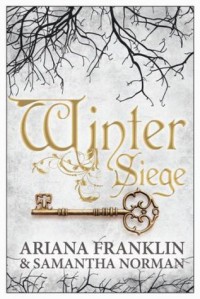Winter Siege
 84. THE SIEGE WINTER, BY ARIANA FRANKLIN & SAMANTHA NORMAN
84. THE SIEGE WINTER, BY ARIANA FRANKLIN & SAMANTHA NORMANThis was recommended to my by a friend who is a big fan of Ariana Franklin. It was “started” by Ariana and “finished” by her daughter, Samantha. My friend told me she didn’t read this one, but she was sure it would be great. I’m afraid she will be sorely disappointed once she does read it.
Synopsis: While England is shaken by the war between Empress Matilda and King Stephen, soldiers roam the land, causing chaos. Gwyl, a mercenary archer, finds a young red-headed girl who was clearly raped and left for dead by his former companions; he nurses her back to health, dresses her as a boy and calls her Penda. They end up at Kenilworth, a small but strategically important castle, where they help harbor the escaping Empress, fend off a siege and confront Penda’s attacker once more.
Overall enjoyment: It was barely readable. The impression I’m left with is that Ariana left a first draft manuscript, and Samantha just proofread it for grammar mistakes and had it published. It’s very unpolished, very awkward to read and simplistic. There was no historical note. I know those aren’t really a requirement, but I’ve come to expect them in historical fiction novels; if anything, so I know how much research the author made.
Plot: The plot twist at the end was painfully obvious. Some plot elements are not appropriate to the time being portrayed (everyone is just fine with Penda turning out to be a girl even though, at the time, that was a crime punishable by death in England; and then even treating her as nobility and introducing her to society–she wasn’t rich or nobly born; even if they decided not to punish her, they would just put her in a dress and make her serve in the kitchen, or something). Mostly, the plot is very character-driven… The problem here is that the characters are very badly developed.
Characters: Ugh. They are so stereotyped their actions almost don’t make sense. The monk is the epitome of evil, Maud is the Strong Female Character who doesn’t lose her femininity (and who gets a cringe-worthy romance scene), Penda is the plucky girl heroine, Gwyl is the strong silent type with a heart of gold. Maybe Ariana was planning to develop them further, but she didn’t get to do it; what we’re left with is a collection of utterly unbelievable and uninteresting characters, running around and being obvious.
World/setting: Once again, the text is not very historically accurate. The big events referenced are real, but the way people relate to each other, their actions, do not correspond to the time they’re supposed to portray.
Writing style: It’s very modern, which feels weird. Even the characters use a very modern speech, saying “totally” and “yuck”; it really clashes with the supposed setting. I haven’t read any other of Ariana’s books, but the impression I have, once again, is that she was planning to fix this on a future editing session and couldn’t get to it.
Representation: None, but then, I wasn’t expecting any.
Political correctness: Oh, well. It is even hard to say, since the characters are so artificial. I’ll just leave this one blank, it’s not worth the bother.
Up next: Random Family, by Adrian Nicole LeBlanc



